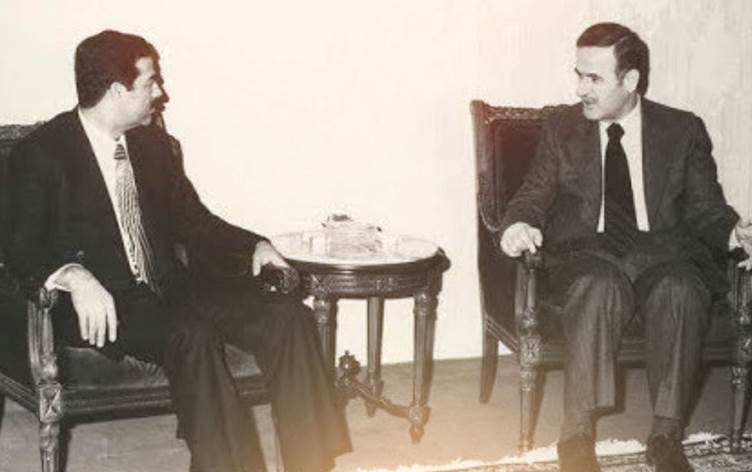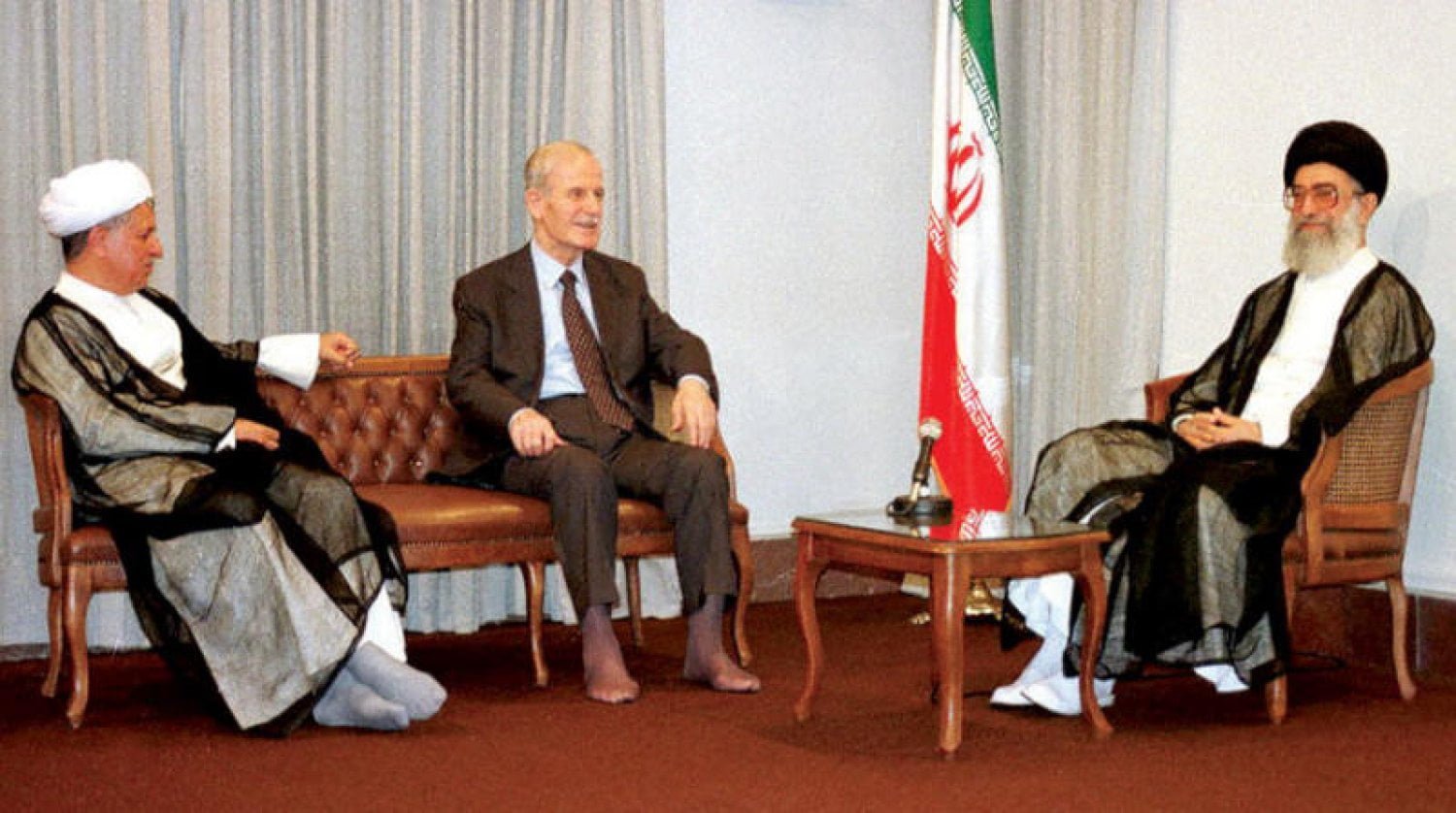Former Syrian Vice President Abdel Halim Khaddam recounts in the eighth episode of his memoirs the use of Palestinian Authority to form the Iraqi leadership and involve it in massing forces on the Syrian border.
According to Khaddam’s memoirs, published by Al-Sharq Al-Awsat newspaper, “One of the most dangerous dangers committed by the leadership of the Palestinian factions was their preoccupation with the internal affairs of some Arab countries (…) and involvement in Arab disputes (…) including the use of the dispute between Syria and Iraq, and the use of the formation of the Iraqi leadership and involving it in massing forces on the Syrian border. I was confronted with this issue during our discussions with Iraq.”
He adds, “In those days, some Iraqi forces did indeed move to the Syrian border to pressure Syria. However, this game was a miserable failure, in addition to reflecting the backwardness of the Iraqi leadership and the superficiality of its decisions. It also reflected the stupidity of the Palestinian leadership, and its involvement and entanglement in placing the Palestine Liberation Organization in positions and circumstances that caused significant damage to the Palestinian cause.”
“On this occasion, Zaid Al-Rifai, the Prime Minister of Jordan, contacted me on June 13th and informed me that the massing of Iraqi forces on the Syrian border was a show of force and a televised maneuver to alleviate pressure in Lebanon, and an attempt to encourage internal movement in Syria, and that there was no intention to cross the border, and that his information came from foreign sources. I thanked Al-Rifai for his call and assured him: (We are not concerned, and we want to avoid a confrontation between the Syrian and Iraqi armies, in order to prevent great harm to both countries and the nation, but if the Brothers get involved, the response will be harsh).”
“After the decision of the Arab League Council was issued on June 10th, the Secretary-General of the League, Mahmoud Riad, moved and visited Beirut, then returned to Damascus on June 15th, and I received him at eight o’clock in the evening. Riad talked about his visit to Suleiman Frangieh, the President of the Lebanese Republic. He said that the outcome of the meeting was an agreement to issue the following statement: (As a result of the meeting regarding the Arab League decision on June 10th, and after the clarifications (…) his Excellency approved this decision, considering it an Arab collective initiative. He also expressed his adherence to the Syrian initiative, due to the hope for ending the fighting and achieving peace in both initiatives),” according to what he said.
And he continued that he asked them, “What are the important points that were discussed with them?” So he answered me: “They want Syria to complete its mission, and they see – or rather imagine – that the most important thing is to withdraw the weapons from the hands of the Palestinians, and thus it can be withdrawn from the hands of all fighters, and handed over to the Arab force. Even (Camille) Chamoun wondered: why shouldn’t Syria alone represent the Arab League in implementing its decision? And I answered him that Syria agreed to the decision as it was issued, and we do not want to burden it alone with this matter. Their impression is that the Palestinians see in the decision the final withdrawal of Syria from their initiative, and they do not want that at all.”
Riad continued: “I asked them frankly: Are they in favor of the Arab League decision or the Arab initiative? Their answer was that they do not object to the decision in principle, but they have some comments: about the security force, for example, they agreed that the security force should be established… and they expressed reservations about the participation of Arab forces from some Arab countries, namely Libya, Algeria, Iraq, South Yemen, and Palestine. I told them that I am authorized by Libya to act, and as for Algeria, we must contact its officials.”
He added that the Lebanese “see Syria’s continuation of its initiative and its non-withdrawal of its forces until the full implementation of the Palestinian resistance Cairo Agreement. Frangieh said that he has full confidence in President Assad and Syria, and that whatever Assad sees, he will agree to it. I told him that we cannot do anything except through Syria, and I will consult with Assad. And I asked him: If we assume that Syria will withdraw its forces to be replaced by Arab forces in some areas, such as withdrawing from Sidon for example and replacing it with Libyan forces, what is your position? He answered that he leaves this matter to President Assad to decide.”
He continued: “I said: We do not see the need to place security forces in Sidon, because the main task of the security forces is to maintain security between Muslims and Christians, as well as between various groups. There must also be an authority to enforce security and prevent crimes that are expected to occur after the ceasefire due to the instability of security. One of the main tasks of these forces is to achieve stability and security. I also asked: Regarding the size of the forces, what did you discuss? Knowing that it is not a condition that the size of the forces should be equal among the participating countries. Riad replied: In my opinion, the backbone is the Syrian forces, and the other forces can be given limited tasks.”
The Secretary-General said: “The important issue now is organization, because I consider that all parties have agreed on the principle. Farhat approved it in the Council, and he represented all factions of the Palestine Liberation Organization, and the Christian side has now agreed, and even President-elect Sarkis and President Frangieh confirmed that they are in complete agreement.”
The Secretary-General suggested “thinking about opening the Damascus-Beirut road for Arab forces to pass through,” to which I replied: “I will discuss all of these matters with the President this evening, and we can hold a meeting tomorrow including the military brothers to develop a comprehensive vision for the mechanics of the work.”
And at eleven o’clock at night, Colonel Antoine Dahdah, the Director of Lebanese General Security, was received, and he brought up the topic of the withdrawal from Beirut, where a detachment of special units was stationed at the airport area, in addition to the geographical communication between our forces and the Christian areas. He answered that the withdrawal from Beirut is a catastrophe, and that their defensive situation is good, but they cannot launch an attack; the army is “exhausted”, but it’s the parties that are fighting, and they have bought new ammunition and weapons and 160mm mortars, and they refuse Arab intervention and want Syria’s initiative to continue and its work.
“It is worth mentioning that the European governments, especially France, did not understand our policy in Lebanon, despite the fact that our entry into Lebanese territory stopped bloody massacres and served as a pressure relief on the Maronite side, which has strong relations with France. During Assad’s visit to Paris on June 17th, Lebanon was the main topic of discussions with President Valéry Giscard d’Estaing,” according to Khaddam.



